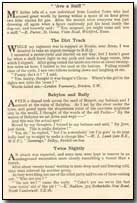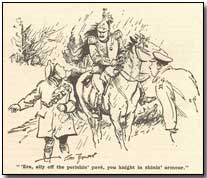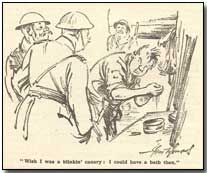Memoirs & Diaries - The Best 500 Cockney War Stories - Twice Nightly and Other Stories
 Published in London
in 1921, The Best 500 Cockney War Stories
comprised, in the words of its newspaper publisher (The London Evening
News) "a remembering and retelling of those war days when laughter
sometimes saved men's reason".
Published in London
in 1921, The Best 500 Cockney War Stories
comprised, in the words of its newspaper publisher (The London Evening
News) "a remembering and retelling of those war days when laughter
sometimes saved men's reason".
The collection of short memoirs, some 500 in total, is divided into five categories - Action, Lull, Hospital, High Seas and Here and There. This page contains five stories from Lull, led by Twice Nightly.
Other sections within the collection can be accessed using the sidebar to the right.
Twice Nightly
An attack was expected, and some men were kept in reserve in an underground excavation more closely resembling a tunnel than a trench.
After about twenty hours' waiting in knee-deep mud and freezing cold, they were relieved by another group.
As they were filing out one of the relief party said to one of those coming out, "Who are you?"
"'Oo are we?" came the reply. "Cahn't yer see we're the fust 'ouse comin' aht o' the pit?"
K. Haddon, 379 Rotherhithe New Road, North Camberwell, S.E.16
In Shining Armour
A horrible wet night on the Locre-Dranoutre Road in 1914. A narrow strip of pave road and, on either side, mud of a real Flanders consistency.
I was on my lawful occasions in a car, which was following a long supply column of five-ton lorries.
I need scarcely say that the car did not try to forsake the comparative security of the pave, but when a check of about a quarter of an hour occurred, I got down from the car and stumbled through the pouring rain, well above the boot-tops in mud, to the head of the column.
Impasse barely describes the condition of things, for immediately facing the leading lorry was a squadron of French Cuirassiers, complete with "tin bellies" and helmets with horse-hair trimmings.
This squadron was in command of a very haughty French captain, who seemed, in the light of the lorry's head-lamps, to have a bigger cuirass and helmet than his men.
He was faced by a diminutive sergeant of the A.S.C., wet through, fed up, but complete with cigarette.
Neither understood the other's language, but it was quite obvious that neither would leave the pave for the mud. Did the sergeant wring his hands or say to the officer, "Mon Capitaine, je vous en prie, etc."?
He did not. He merely stood there, and, removing his cigarette from his mouth, uttered these immortal words:
"'Ere, ally off the perishing pave, you son of a knight in shinin' armour!"
And, believe me or believe me not, that is what the haughty one and his men did.
"The Ancient Mariner," Sutton, Surrey
"A Blinkin' Paper-Chase?"
One pitch black rainy night I was bringing up the rear of a party engaged in carrying up the line a number of trench mortar bombs known as "toffee-apples."
We had become badly tailed-off during our progress through a maze of communication trenches knee-deep in mud, and as I staggered at last into the support trench with my load I spied a solitary individual standing on the fire-step gazing over the parapet.
"Seen any Queen's pass this way?" I inquired.
"Blimey," he replied, apparently fed-up with the constant repetition of the same question, "wot 'ave you blokes got on tonight - a blinkin' piper-chise?"
W. H. Blakeman (late Sergt., Queen's R.W.S. Regt.), 22 Shorts Road, Carshalton
Biscuits - Another Point of View
In April 1915 my battalion was on the way up to take over a line of grouse-butts - there were no continuous trenches - in front of a pleasure resort by the name of Festubert.
Arrived at Gore, a couple of miles or so from the line, we ran into some transport that had got thoroughly tied up, and had a wait of about half-an-hour while the joy-riders sorted themselves out.
It was pitch dark and raining hard, and the occasional spot of confetti that came over added very little to the general enjoyment.
As I moved up and down my platoon, the usual profane but humorous grousing was in full spate. At that time the ration arrangements were not so well organised as they afterwards became, and for some weeks the bulk of our banquets had consisted of bully and remarkably hard and unpalatable biscuits. The latter were a particularly sore point with the troops.
As I listened, one rifleman held forth on the subject. "No blinkin' bread for five blinkin' weeks," he wound up - "nothin' but blinkin' biscuits that taste like sawdust an' break every tooth in yer perishin' 'ed. 'Ow the 'ell do they expect yer to fight on stuff like that?"
"Whatcher grousin' about?" drawled another weary voice. "Dawgs lives on biscuits, and they can fight like 'ell!"
S. B. Skevington (late Major, 1st London Irish Rifles), to Berkeley Street, W.1
His Bird Bath
A battalion of the Royal Fusiliers (City of London Regiment) was in support, and a private was endeavouring to wash himself as thoroughly as possible with about a pint of water in a mess-tin.
A kindly disposed staff officer happened to come along, and seeing the man thus engaged, said, "Having a wash, my man?"
Back came the reply, "Yus, and I wish I was a blinkin' canary. I could have a bath then."
R. G. Scarborough, 89 Tennyson Avenue, New Malden, Surrey
Next - Ducking 'em - then Nursing 'em and four other stories
"Bellied" was a term used to describe when a tank's underside was caught upon an obstacle such that its tracks were unable to grip the earth.
- Did you know?


